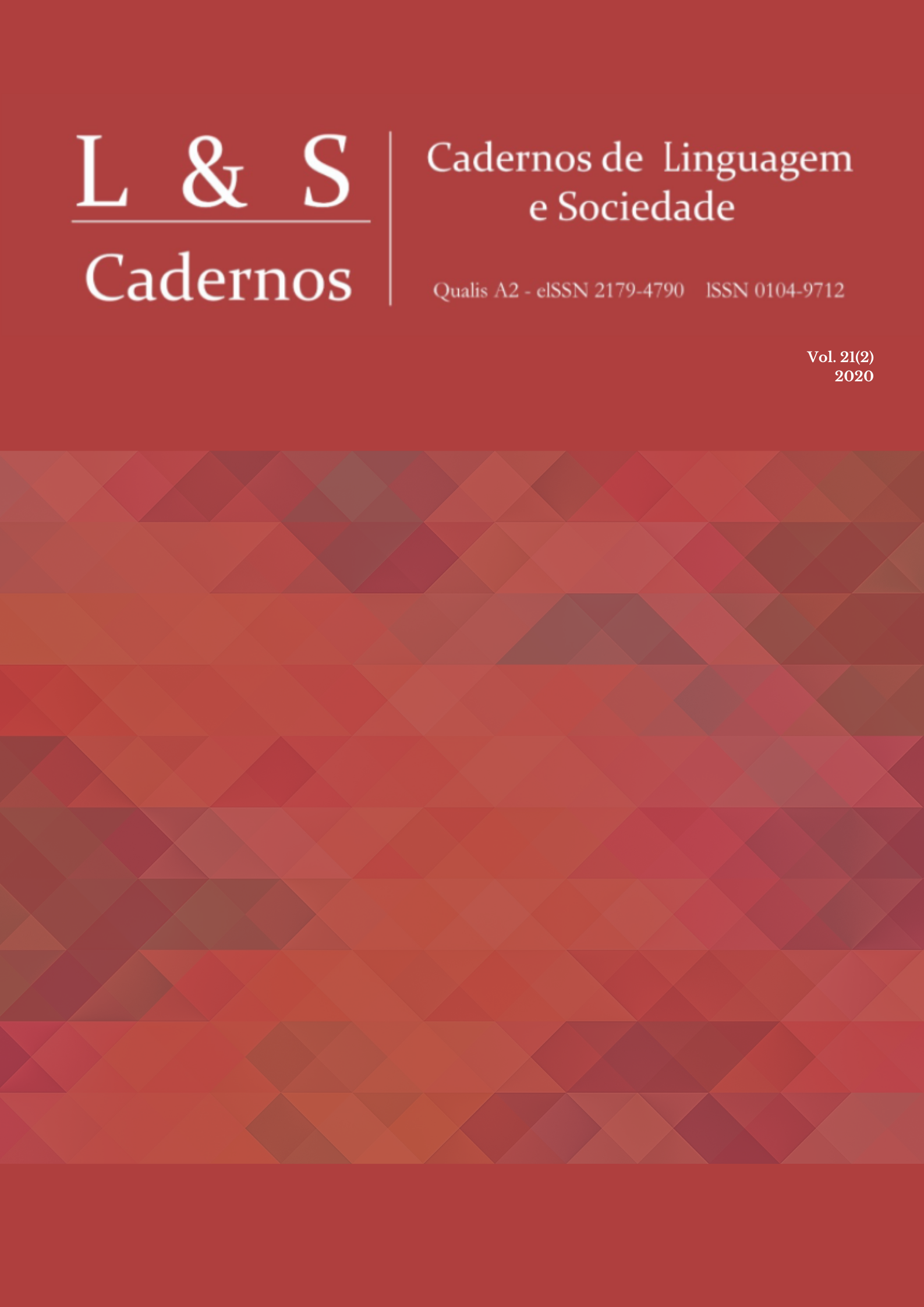Por uma ideologia linguística responsiva à s teorizações Queer
DOI:
https://doi.org/10.26512/les.v21i2.35701Palavras-chave:
Linguagem, Teoria QueerResumo
Neste artigo, em um primeiro momento, discutimos estudos queer sobre quem somos como seres sociais na expressão do gênero, da sexualidade, e da raça, entre outros. Em seguida, tratamos da conexão dizer-fazer-ser. Antes, porém, cabe um breve debate de natureza epistemológica sobre a produção do conhecimento no campo de estudos da linguagem.
Downloads
Referências
AGAMBEM, G. Homo sacer: O poder soberano e a vida nua. Trad. Henrique Burigo. Belo Horizonte: Editora UFMG, 1995/2002.
ANDERSON, B. Imagined communities. Londres: Verso, 1983.
AUSTIN, J. How to do thinngs with words. Oxford: Claredon Press, 1962.
BARNARD, I. Queer race. Nova York: Lang, 2004.
BAUMAN, Z. Intimations of postmodernity. Londres: Routledge, 1992.
BAUMAN, Z Voices of modernity: language ideologies and the politics of inequality. Cambridge: Cambridge University Press, 2003.
BAUMAN, Z; BRIGGS, C. Poetics and performance as critical perspectives on language and social life. In: COUPLAND, N; JAWORSKI, A. (org.). The new sociolinguistics reader. New York: Palgrave Macmillan, 1990/2009. p. 607-614.
BAYNHAM, M. Towards performative sociolinguistics? On coming out and staying out in narrative and interaction. Trabalho apresentado no Congresso Sociolinguistics of Globalization, University of Hong-Kong, mimeo, 2015.
BLOMMAERT, J. Chronotopes, scales and complexity in the study of language in society. Annual Review of Anthropology, Tilburg Universiyty, mimeo, 2015.
BLOMMAERT, J. Discourse: key topics in sociolinguistics. Cambridge: Cambridge University Press, 2005.
BLOMMAERT, J. The sociolingusitics of globalization. Cambridge: Cambridge University Press, 2010.
BLOMMAERT, J.; DE FINA, A. Chronotopic identities: On the timespace organization of who we are. Tilburg papers in cultures studies, paper 153. Tilburg University, 2015.
BLOMMAERT, J.; RAMPTON, B. Language and superdiversity: a position paper. Working papers in urban language & literacies, Paper 70. Tilburg University and King's College, 2012.
BRICE HEATH, S. Telling Tongues: Language Policy in Mexico, Colony and Nation. New York: New York Teachers’ College Press, 1972.
BUTLER, J. Gender trouble: feminism and the subversion of identity. Nova York: Routledge, 1990.
BUTLER, J. Gender as Performance: An Interview with Judith Butler. Entrevista com Peter Osborne and Lynne Segal. Radical Philosophy, 67, 1994.
BUTLER, J. Bodies that matter. On the discursive limits of "sex". Nova York: Routledge, 1997.
CAMARGO, M. "Acuenda esse bajubá!': indexicalidades e interseccionalidades nas performances narrativas de uma travesti quilombola. Tese de Doutorado. Programa Interdisciplinar de Lingüística Aplicada. Universidade Federal do Rio de Janeiro, 2019.
CARR, E.; LEMPERT, M (org.) Scale. Discourse and dimensions of social life. Oakland: University of California Press, 2016.
COLLINS, J. Indexicalities of language contact in an era of globalization: engaging with John Gumperz’s legacy. Text & Talk, v; 31, n. 4, p. 407-428, 2011.
DE LAURETTIS, T. Queer theory: lesbian and gay sexualities. Differences, v. 3, n. 2, p. iii-xvii, 1991.
ECO, U Fascismo eterno. Trad. Eliana Aguiar. Rio de Janeiro: Editora Record, (1995/2018).
FAIRCLOUGH, N. Discurso e mudança social. Tradução Coordenada por Maria Isabel Magalhães. Brasília: Editora da UnB, 2001.
FABRÃCIO, B. F. A “outridade lusófona” em tempos de globalização: identidade cultural como potencial semiótico. In: MOITA LOPES, L. P. (ed.). O Português no Século XXI: cenário geopolítico e sociolinguístico. São Paulo: Parábola, 2013
FABRÃCIO, B. F.; MOITA LOPES, L. P. Creating queer moments at a Brazilian school by forging innovative sociolinguistic scalar perspectives in classrooms. In: SAUNTSON, Helen; KJARAN, Jon (org.) Queer transformative spaces: global narratives on gender and sexualities in schools. New York: Routledge, 2019.
FERNANDES, E. R. Existe índio gay? A colonização das sexualidades indígenas no Brasil. Curitiba: Brazil Publishing, 2019.
FERNANDES, E. R.; ARISI, B. M. Gay Indians in Brazil: Untold stories of the colonization of indigeneous sexualities. Nova York: Springer, 2017.
FOUCAULT, M. Microfísica do poder. Rio de Janeiro: Graal, 1979.
FOUCAULT, M. The birth of biopolitics: Lectures at the Collège de France, 1978-1979. Tradução Graham Burchell. Nova York: Palgrave MacMillan, 1978-1979/2008.
GEE, J. An Introduction to discourse analysis: theory and method. London: Routledge, 1999.
GUIMARÃES, T.; MOITA LOPES, L. P. Trajectories of a viral text in different communicative events: entextualisation, indexicality, identity performances and ethnography. ALFA: Revista de Linguística (UNESP. IMPRESSO), v. 61, p. 11-33, 2017.
HELLER, M. Language as a resource in the globalized new economy. In: Coupland, N. (Org.). The handbook of language and globalization. Nova York: Wiley-Blackwell, 2010.
JAGOSE, A. Queer Theory. An Introduction. Nova York: New York University Press, 1996.
JACQUEMET, M. Transidiomatic practices: language and power in the age of globalization. Language & Communication, v. 25, p. 257-277, 2005.
KRESS, G.; VAN LEEUWEN, T. Multimodal discourse. Londres: Bloomsbury Academic, 2001.
KRISTEVA, J. Introdução à Seminálise. São Paulo: Debates, 1969.
MAKONI, S.; MEINHOF, U. Linguística Aplicada na África: desconstruindo a noção de “língua”. In: MOITA LOPES, L. P. (org.) Por uma Linguística Aplicada Indisciplinar. São Paulo: Parábola, 2006/2016.
MAKONI, S.; PENNYCOOK, A. (org.). Disinventing and reconstituting languages. Toronto: Multilingual Matters, 2007.
MÁRQUEZ, N.; LAJE, A.. El libro negro de la nueva izquierda: ideología de género o subversion cultural. Madrid: Unión Cultural, 2014.
MBEMBE, A. Necropolítica: Biopoder, Soberania e Estado de Exceção. Arte e ensaios, n. 16, 2016. Disponível em: https://revistas.ufrj.br/index.php/ae/article/view/8993/7169. Acesso em: 15 jul. 2019.
MOITA LOPES, L. P. Discursos de identidade em sala de aula de leitura de L1: a construção da diferença. In: SIGNORINI, Inês (org.). Língua(gem) e identidade: elementos para uma discussão no campo aplicado. Campinas: Mercado de Letras, pp. 303-330, 1998.
MOITA LOPES, L. P. Identidades fragmentadas: A construção discursiva de raça, gênero e sexualidade em sala de aula. Campinas: Mercado de Letras, 2002.
MOITA LOPES, L. P. Inglês e globalização em um epistemologia de fronteira: ideologia linguística para tempos híbridos. DELTA. Documentação de Estudos em Linguística Teórica e Aplicada (PUCSP. Impresso), v. 24, p. 309-340, 2008.
MOITA LOPES, L. P. A performance narrativa do jogador Ronaldo como um fenômeno sexual em um jornal carioca: multimodalidade, posicionamento e iconicidade. Revista da ANPOLL, v. 27, p. 129-160, 2009.
MOITA LOPES, L. P. (org.) Português no século XXI. São Paulo: Parábola, 2013.
MOITA LOPES, L. P. Guarani/Portuguese/Castellano rap on the borderland: transidiomaticity, indexicalities and text spetacularity. In: CAVALCANTI, M.; MAHER, T. (org.). Multilingual Brazil: language resources, identities and ideologies in a globalized world. Nova York: Routledge, 2017.
MOITA LOPES, L. P. (org.) Global Portuguese. Linguistic ideologies in late modernity. New York: Routledge, 2018.
MOITA LOPES, L. P.; FABRÃCIO, B. F. ‘Does the picture below show a heterosexual couple or not?’: reflexivity, entextualization, scales and intersectionalities in a gay man’s blog. In: COOKE, M.; GRAY, J. (ed.). Gender and Language: Intersectionality, language and queer lives. v. 12, n. 4, p. 457-478, 2018a
MOITA LOPES, L. P.; FABRÃCIO, B. F. Viagem textual pelo sul global: ideologias linguísticas queer e metapragmáticas translocais. Linguagem em (Dis)curso ”“ LemD, Tubarão, SC, v. 18, n. 3, p. 759-784, set./dez. 2018b.
MOITA LOPES, L. P.; GUIMARÃES, T. F. Scaling queer performativities of genders and sexualities in the periphery of Rio de Janeiro in digital and face-to-face semiotic encounters. In: KROON, S.; SWANENBERG, J. (org.). Language and Culture on the Margins. Local/Global Interactions. Londres: Routledge, 2019.
NAGEL, T. The view from nowhere. Nova York: Oxford University Press, 1986
PELÚCIO, L. Possible appropriations and necessary provocations for a teoria cu. In: LEWIS, E. S.; BORBA, R.; FABRÃCIO, B.; PINTO, D. S. (org.) Queering paradigms IV: South-north dialogueson queer epistemologies, embodiments and activisms. Oxford: Peter Lang, p. 31-51, 2014.
PENNYCOOK, A. Global Englishes and transcultural flows. New York: Routledge, 2007.
PENNYCOOK, A. Language as a local practice. Londres: Routledge, 2010.
PENNYCOOK, A. Language and mobility: unexpected places. Toronto: Multilingual Matters, 2012.
PINTO, J. P. Prefiguração identitária e hierarquias linguísticas na invençao do português. In: MOITA LOPES, L. P. (org.) Português no século XXI. São Paulo: Parábola, p. 120-143, 2013.
PINTO, J. P. Corpo como contexto-de-ocorrência de metapragmáticas sobre o português em socializações de estudantes migrantes para o Brasil. Linguagem em (Dis)curso, v. 18, n. 3, p. 751-768, 2018.
PRATT, M. L. Linguistic utopias. In: FABB, N. et al. (ed.). The linguistics of writing. Manchester: Manchester University Press, p. 48-66, 1987.
PRECIADO, P. B. Multitudes queer. Multitudes, v. 2, n. 12, p. 17-25, 2003. Disponível em: http://www.cairn.info/revue-multitudes-2003-2-page-17.htm#pa1. Accesso em: 5 maio 2015.
PUAR, J. K. Terrorist assemblages. Homonationalism in queer times. Durham: Duke University Press, 2007.
SEDGEWICK, E. K. The epistemology of the closet. Berkeley: University of California Press, 1990.
SCOTT, D. Refashioning futures. Criticism after postcoloniality. Princeton: Princeton University Press, 1999.
SILVERSTEIN, M. Indexical order and the dialectics of sociolinguistic life. Language and Communication, v. 23, p. 193-229, 2003.
SNYDER, T. Sobre a tirania. Vinte lições do Século XX para o presente. Tradução Donaldson M. Garschagen. São Paulo: Companhia das Letras, 2017.
SNYDER, T. The road to unfreedom. Russia, Europe, America. New York: The Duggan Books, 2018.
SANTOS, B. S. A difícil reinvenção da democracia frente ao fascismo social. Entrevista com Roberto Machado. 2016. Disponível em: http://www.ihu.unisinos.br/159-noticias/entrevistas/563035-a-dificil-reinvencao-da-democracia-frente-ao-fascismo-social-entrevista-especial-com-boaventura-de-sousa-santos, Acesso em: 31 ago. 2018.
STANLEY, J. Como funciona o fascismo: a política do “nós” e “eles”. Tradução Bruno Alexander. Porto Alegre: L&PM, 2018.
MALDONADO-TORRES, Nelson. On the coloniality of being. Cultural Studies, v. 21, n. 2-3, p. 240-270, 2007.
VENN, C. Occidentalism: Modernity and subjectivity. Londres: Sage, 2000.
Downloads
Publicado
Edição
Seção
Licença
Copyright (c) 2020 Cadernos de Linguagem e Sociedade do Programa de Pós-Graduação em Linguística da UnB é licenciado sob uma Licença Creative Commons Atribuição-Uso não-comercial-Vedada a criação de obras derivadas 3.0 Unported.

Este trabalho está licenciado sob uma licença Creative Commons Attribution 4.0 International License.
Autores/as que publicam nesta revista concordam com os seguintes termos:
Autores/as mantêm os direitos autorais e concedem à revista o direito de primeira publicação, sendo o trabalho simultaneamente licenciado sob a Creative Commons Attribution 4.0 International license que permite o compartilhamento do trabalho com reconhecimento da autoria do trabalho e publicação inicial nesta revista.



